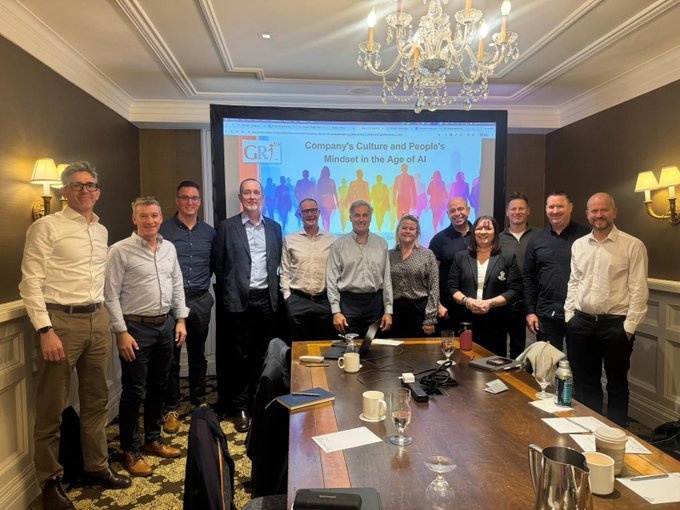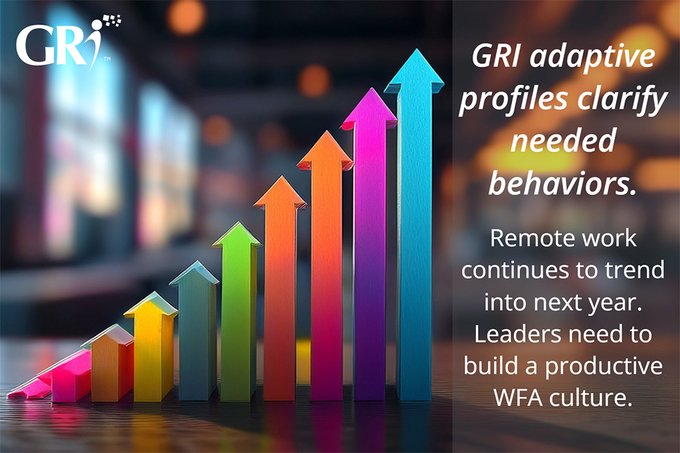Embracing the Future of Work
Posted by Frederic Lucas-Conwell

Embracing the Future of Work
The "Future of Work" has quickly become a buzzword in Silicon Valley and elsewhere.
Born out of a rapidly changing Internet and evolving digital and mobile technologies, the Future of Work immediately brings to mind things like automation, robotics and artificial intelligence (AI).
On the employee and people management front, this future makes it critical for companies to create cultures in which individuals perform with positive appreciation of their work, and to better attract, retain, and manage talent than their competitors do.
For each of us, this future invites us to adapt and to continue learning at high speed, while finding a new balance in our lives. Let's start with today's understanding of the Future of Work and the dramatic shifts that are happening, before looking at how this change can help foster a better future for us all.
New Perspectives for Work
Versions of AI and machine learning, while not quite at "Star Trek" levels, continue making appearances. "Bots" made up of complex algorithms are progressively assisting human customer service representatives. Cars that drive themselves may eventually put cabbies, bus drivers and even Uber and Lyft drivers out of work.
Yet, as forecasts continue to remind us, there is no shortage of work.
According to McKinsey's 2017 report(1) , "... about half the activities people are paid to do globally could theoretically be automated using currently demonstrated technologies."
However, "very few occupations-less than 5 percent-consist entirely of activities that can be fully automated."
The Industrial Revolution of the 1800's ended many rural and agricultural jobs, but also created new jobs in manufacturing and factories, types of work that had not been envisioned just a few years earlier.
The Future of Work's digital revolution can be seen as a shift from work done in one place for a set amount of time, to work that can be done anywhere at any time; from physical labor, to"knowledge" work; from rigid assignments, to jobs that offer more flexibility and autonomy.
Other important changes include the following:
- Contingent Work is Becoming the New Normal
One can take on different projects more easily than ever in different activities, across industries, whether it's consulting, marketing, coding, editing, transcribing, illustrating, translating, babysitting, dog walking, renting houses or driving cars.
As new online platforms continue to emerge, contingent workers take advantage of them to reach a wider audience for their expertise, while having more flexibility and the opportunity to organize their work and leisure time on their own.
- Opportunities Are Being Offered to all Generations
With the Baby Boomers continuing to retire in the coming years, and the smaller GenX following soon, experienced workers will continue to be in demand.
The market offers vast opportunities for younger generations, including those who want to take leadership positions, or grow new competencies at a fast pace. For older generations, retirement can become a "Second Act", allowing those who enjoy their work to continue utilizing their expertise by semi-retiring.
- Creativity and New jobs are Increasing
New, amazing services and products constantly surface. New companies will continue to emerge, with new jobs being created.
For instance, at the same time that Amazon was deploying 100,000 robots across its 75-plus fulfillment centers in the U.S., it actually hired 135,000 people.(2) As Amazon's Worldwide Consumer CEO Jeff Wilke puts it: "Technology changes work...It allows them [humans] to do higher-quality work. It allows them to be more efficient."
- Entrepreneurship is Expanding
Entrepreneurship is more accessible today, as a lifestyle and as a source of revenue. Thanks to accelerators like Y Combinator and 500 Startups, learning environments like Singularity University, and co-work spaces like GSVLabs and HeraHub, plus many other programs, assistance is available to entrepreneurs to learn how to start a company, pitch, or raise capital and make a living being an entrepreneur.
Large corporations and investors are quickly learning to take advantage of this new pool of ideas and energy, and compensate for it.
When we shift our perspective, we see the Future of Work as offering changing, rather than diminished opportunities. It may eliminate some jobs, but new ones are created.
Work Balance Impacts Both Individuals and Companies

Traveling in Los Angeles for business recently, I got to talking with my Lyft driver. Like so many others, he is driving for several reasons. It turns out he is a chef and restaurateur who had just closed his last restaurant and was working on opening the next. He picks up fares in the evenings and on weekends, getting some extra income and, maybe more importantly, having the flexibility to find his new restaurant location, manage the setup process, and attend to the permits and licenses that can only be secured during standard business hours.
The Future of Work offers everyone new ways to generate revenues, and to better balance work with personal life. At the same time, the workers of the future need to more quickly show effectiveness, accountability, and trustworthiness in the work they deliver; trial periods will continue to shorten.
For companies, being capable of creating a balanced pool of skilled employees and contingent workers, and fostering their talent, is becoming more critical. Larger organizations may even embrace the idea of becoming "talent incubators" to grow their talent internally, rather than suffering the costs and delays that can come with hiring from the outside.
Companies as "platforms" - the new, consecrated term - (Uber, UpWork, etc.) are another option that can provide more freedom to workers.
The Future of Work is an opportunity for companies to rethink hiring and organizing talents, and growing value more effectively.
When it comes to better understanding individuals, and what they need in the Future of Work, including from their organizations, we observe with the GRI the following growing trends:
- People are More in Charge of Their Destiny
Even more than before, people are on their own to stay competent, relevantly talented, and valuable, continuing learning and growing beyond the traditional college years. They also need to be knowledgeable of their own preferences so that they can set their goals, identify and advance their interests, and decide how they want to accomplish both.
People want to have a better command of their performance. They are becoming more knowledgeable of their own needs, of the training programs or learning methods that suit them. They are becoming more aware of their unique way to develop their sense of purpose, and to succeed.
- Job Seekers are Selective
Candidates are more informed and careful about the companies they are interviewing for: they pay attention to the way companies recruit, select, manage, reward, and promote.
They are more likely to base their decision about which company to work for on intangibles like culture and development opportunities, than pay and perks.
- Trusted Relationships are Key
Once recruited, employees are more sensitive to the quality of the team they work with, including their manager, supervisor, scrum-master, or board members. How will the relationship build? Will the manager or the board provide understanding and support?
Career counseling, coaching, professional and personal development programs have partially addressed these points. However, if the corporations do not provide the understanding and support they are being asked for, individuals will not hesitate to take the initiative by moving on to another job at a more promising organization.
Embracing Intrinsic Motivation
The Future of Work forces individuals as well as companies and their managers to adjust their understanding of what makes someone unique, rather than what coincides with a general understanding that quickly falls into stereotypes.
The "Past of Work" used managerial tactics that were applied unilaterally to all, in order to influence employees in the direction that the company wished, in agreement with its vision, mission and goals. They included behavioral reinforcement and cognitive tactics, rigid reward systems, static performance reviews, and so on.
But these efforts at external motivation have never wholly worked, and are now showing their true limits as we move into the Future of Work. This opens up the need to better understand individuals' intrinsic motivations.
Identifying and clarifying our unique motivation and everything that comes with it in terms of how we learn, communicate, prioritize our goals, or make decisions, is one of the GRI's powerful benefits.
By looking more precisely at the behaviors and motivations expected in positions (something we refer to as the PBI - Position Behavior Indicators) - rather than an almost exclusive focus on competencies and skills - we are able to more accurately understand how people can better perform in them, and how they may need support to adapt.
An increased awareness of how people are motivated internally must be integrated into the design of future organizations, and into how new positions are created, if companies are to survive the Future of Work.
Making the Future of Work
While we don't have a crystal ball and cannot predict the future with certainty, there is much that is already becoming clear about the Future of Work.
In environments always demanding more effectiveness and performance, the Future of Work invites companies and individual contributors alike to look more effectively at how people perform, feel engaged, fulfilled, and motivated, while expressing the required behaviors in a job.
Data science and analytics are already showing up in Human Resources and management. Better understanding how to hire, deploy and enhance human talent, by integrating it alongside the automation that is becoming pervasive in all industries, will bring a competitive advantage to companies and their workforce.
With an augmented understanding of people and use of technology, the Future of Work can be designed to provide a better future for all.
At GRI we are excited to be a partner in making the Future of Work, work for all!
Resources
(1) See article on McKinsey website, December 2017
(2) See article in Yahoo Finance, January 2018
Images: 123RF
Latest Articles
Groupama Successful Transformation in Romania: The GRI, Catalyst for Profound Change
The history of Groupama in Romania is an eloquent testament to resilience, strategic vision, and the transformative impact of innovative management tools. Arriving at the...
Hybrid Work: A Management Revolution
The COVID-19 pandemic has acted as an unprecedented catalyst, radically transforming our approach to work. What was once a marginal practice has become the norm for many...
Leadership 3.0: Objective Insights for People-Centric Leaders
Steve, a brilliant entrepreneur, poured his heart into his work. His team at "Innovatech" was on the brink of a major breakthrough, a new app that promised to revolutionize...



